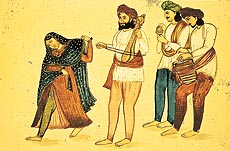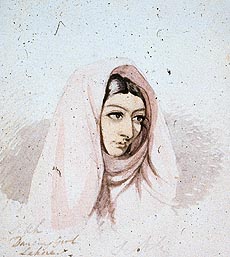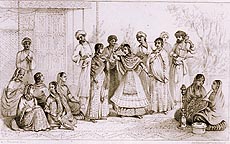










 








 

 |
The nautch
girls of colonial Punjab
By Pran
Nevile
FROM time immemorial, poets and
bards have sung in praise of the dancing damsels who
appear as Apsaras in mythology, and as ganikas,
nartakis, devadasis, kanchanis, tawaifs and nautch
girls at different periods of history. They belonged to a
class of professional entertainers who were accomplished
dancers and singers. Over the centuries, they nurtured
and preserved the classical performing arts in the
country.
The musicians and
dancers in Punjab received generous patronage from the
Mughals, who were fond of lively entertainment, dancing
being one of their principal diversions. They brought to
India Persian dancing girls, with their own distinctive
styles of singing and dancing. The Mughal period saw the
emergence of new musical forms and styles of singing such
as Thumri, Dadra and Ghazal which opened a
new vista of romantic themes for the dancing girls of
Lahore, an imposing seat of the Mughal empire. The
tradition continued during the Sikh rule. According to a
contemporary account, Maharaja Ranjit Singh maintained a
troupe of 150 dancing girls selected from among the best
in Kashmir, Persia and Punjab. There is a fascinating
account of their performance as witnessed by some British
dignitaries visiting the Maharaja’s court.
The institution of
professional dancing girls continued to flourish after
the coming of British rule in Punjab. The word
‘nautch’ is an Anglicised form of Hindi/Urdu
word nach meaning dance. The ‘nautch’
represented the cultural interaction between the native
and the early English settlers in India. Its professional
exponent, the dancing girl in her new incarnation emerged
as the ‘nautch girl’. The sahibs used to
attend nautch parties held by the Punjabi aristocracy.
Earlier they had been themselves great patrons of the
nautch entertainment in Calcutta and other presidency
towns.
The opening of Suez
Canal ushered in the ‘Age of memsahibs’,
which brought a sea change in the British social life in
India as also in the Punjab. By this time, the
missionaries had extended their activities in Punjab to
propagate the virtues of Christian civilisation. They
denounced native religious practices, social customs and
manners. The nautch entertainment, sought-after by the
Punjabis on every joyous occasion, came under heavy
attack when the missionaries took it up as a moral issue.
Some of them went to the
extent of saying that ‘nautch’ aroused
anti-Christian feelings. They failed to understand the
origin and nature of Indian music and dance art and
condemned it as repulsive and immoral. They were unable
to make out the distinction between a talented and
accomplished professional nautch girl and a common
prostitute, dubbing both as fallen women. The British
official elite were now urged by them to refrain from
attending functions organised by the Punjabis where
nautch entertainment was held.
 A group of western educated
Indian social reformers, influenced by western ideas and
victorian moral values, joined the missionaries and they
started an anti-nautch movement at Madras, which spread
to other parts of the country including Punjab. In their
anti-nautch campaign, they were now joined by the Social
Purity Associations, sponsored by the Purity movement in
England for reform of the public and private morals. The
Punjab Purity Association of Lahore launched a forceful
drive against the ‘nautches’ and published a
booklet in 1984 containing the opinions of the educated
Punjabis on the ‘nautch question’. The booklet
highlighted the denunciation of nautch by the eminent
social reformer Keshub Chandra Sen who described the
nautch girl as a "hideous woman with hell in her
eyes. In her breast is a vast ocean of poison. Round her
comely waist dwell the furies of hell... her
blandishments are India’s ruin. Alas! her smile is
India’s death". A group of western educated
Indian social reformers, influenced by western ideas and
victorian moral values, joined the missionaries and they
started an anti-nautch movement at Madras, which spread
to other parts of the country including Punjab. In their
anti-nautch campaign, they were now joined by the Social
Purity Associations, sponsored by the Purity movement in
England for reform of the public and private morals. The
Punjab Purity Association of Lahore launched a forceful
drive against the ‘nautches’ and published a
booklet in 1984 containing the opinions of the educated
Punjabis on the ‘nautch question’. The booklet
highlighted the denunciation of nautch by the eminent
social reformer Keshub Chandra Sen who described the
nautch girl as a "hideous woman with hell in her
eyes. In her breast is a vast ocean of poison. Round her
comely waist dwell the furies of hell... her
blandishments are India’s ruin. Alas! her smile is
India’s death".
The circular letter
dated 19th June, 1893, which elicited their
‘opinions’ on the nautch question is reproduced
below. "The custom of celebrating festive occasions
by nautches prevails in our country. The nautch girls are
as a rule, public prostitutes. To encourage them in any
way is considered immoral by some people. They hold that
the nautches only give opportunities to the fallen women
to beguile and tempt young men. There are some, again,
who consider dancing girls to be the depositaries of our
music and see nothing objectionable in attending
nautches. This is a question of vital importance for the
moral welfare of youngmen.
May I, therefore,
respectfully solicit your valuable opinion on the
subject. If you are of opinion that nautches are really
dangerous to the moral well-being of our youth, I would
also invite your suggestions as to how nautches may be
done away with, or young men may be restrained, from
attending them. All opinions collected will be
published".
 The
educated Punjabis who were addressed to give their
opinions included the following: Lala Madan Gopal, MA,
Bar-at-Law, Lahore, Lala Shiv Dayal,MA, Assistant
Inspector of Schools, Muhammad Shafi, Bar-at-law,
Hoshiarpur, Pandit Devi Chand, Pleader, Jullundhar, Lala
Munshi Ram, Pleder, Jullundur, Lala Sunder Dass Suri, MA,
Headmaster, M.B. School, Mooltan, H.C. Mukerji, Pleader,
Rawalpindi, Lala Amolak Ram, tutor to H.H. Raja of
Bilaspore, Moulvi Rahim Bux, MA, Mcleod Arabic Reader,
Oriental College, Lahore, Rai Dass Ram, Mullick, Lahore,
Sirdar Amar Singh, Simla, Lala Hans Raj Sahny, Pleader,
Rawalpindi, Lala Dharam Dass Suri, Pleader, Shaharanpur,
Lala Harkishan Lall, BA, (Cantab), Pandit Janaki Pershad,
Kashmir Pandits National Association, Lahore, Lala Lal
Chand, MA, Pleader, Lahore, Lala Lajpat
Rai,Pleader,Lahore, Sirdar Sobha Singh, MA, District
Inspector of School, Amritsar and Pandit Bulaki Ram
Sastri, Bar-at-law, Lahore. The
educated Punjabis who were addressed to give their
opinions included the following: Lala Madan Gopal, MA,
Bar-at-Law, Lahore, Lala Shiv Dayal,MA, Assistant
Inspector of Schools, Muhammad Shafi, Bar-at-law,
Hoshiarpur, Pandit Devi Chand, Pleader, Jullundhar, Lala
Munshi Ram, Pleder, Jullundur, Lala Sunder Dass Suri, MA,
Headmaster, M.B. School, Mooltan, H.C. Mukerji, Pleader,
Rawalpindi, Lala Amolak Ram, tutor to H.H. Raja of
Bilaspore, Moulvi Rahim Bux, MA, Mcleod Arabic Reader,
Oriental College, Lahore, Rai Dass Ram, Mullick, Lahore,
Sirdar Amar Singh, Simla, Lala Hans Raj Sahny, Pleader,
Rawalpindi, Lala Dharam Dass Suri, Pleader, Shaharanpur,
Lala Harkishan Lall, BA, (Cantab), Pandit Janaki Pershad,
Kashmir Pandits National Association, Lahore, Lala Lal
Chand, MA, Pleader, Lahore, Lala Lajpat
Rai,Pleader,Lahore, Sirdar Sobha Singh, MA, District
Inspector of School, Amritsar and Pandit Bulaki Ram
Sastri, Bar-at-law, Lahore.
It is interesting to
note from their replies, that practically all the above
mentioned gentlemen denounced ‘nautch’ as a
baneful custom affecting the welfare of society, and
supported the proposal of abolishing this practice. But,
many of them thought "that some good substitute
would obviate the difficulty and soon put an end to the
evil complained of." It was, however, conceded by
some that the art of music and dancing was confined to
the women of this class and the best alternative was to
introduce the study of music in schools and encourage the
formation of theatrical companies. Easily, the most
remarkable and constructive comments came from Lala
Harkishan Lall, Bar-at-Law, the father of banking in the
Punjab. He wrote: "According to our ancient beliefs
and ideas, music and dancing are heavenly, while
prostitution is hellish. With you the question ought to
be how to divorce blessing from curse and separate one
from the other. In this way you may increase purity of
life in India and lessen the chances that the devil has
to ensnare the youths of the country". Another
interesting observation was made by H.C. Mukerji, who
said: Let us teach our wives and daughters to practice
music at home, so that they may entertain their husbands
and brothers. Musical clubs should be organised in all
important places, not simply for the private
entertainment of the members among themselves but for
giving performances on festive occasions".
 The anti-nautch campaign, however, soon
fizzled out in Punjab as the majority of Punjabis loved
to enjoy life and so they continued to patronise the
nautch girls. The number of western educated Punjabis
around the turn of the century was too small to have any
significant impact on society at large. The anti-nautch campaign, however, soon
fizzled out in Punjab as the majority of Punjabis loved
to enjoy life and so they continued to patronise the
nautch girls. The number of western educated Punjabis
around the turn of the century was too small to have any
significant impact on society at large.
Thanks to the patronage
of the emerging rich business class, the landed gentry
and the princely states in Punjab, the profession of
nautch girls continued to thrive, thus keeping alive the
traditional performing arts. Their presence on the
occasion of a wedding or some other joyful event was
considered to be a status symbol and an auspicious sign.
The princes and the chiefs took pride in patronising
accomplished nautch girls and usually invited the ruling
sahibs who graced such functions with their presence.
The art of music and
dance had been confined to the families of professional
nautch girls for generations. As the 20th century rolled
on, new opportunities came up for them with establishment
of theatrical companies. Broadcasting saw some of them
take to singing as radio artists. But it was the advent
of cinema that came as a real breakthrough for them to
display their talents as actresses, singers and dancers.
Later, many of them grew up to be leading stars such as
Anwari, Sardar Akhtar, Khurshid, Mumtaz Shanti, Munawar
Sultana, Zohra Bai etc. As time passed, the changing
social and economic environment and with decline of
patronage the nautch girl lost part of her traditional
role and relevance. After independence, with the
nationalisation of culture, the age-old institution of
nautch girls virtually vanished from the entertainment
scene.
|

